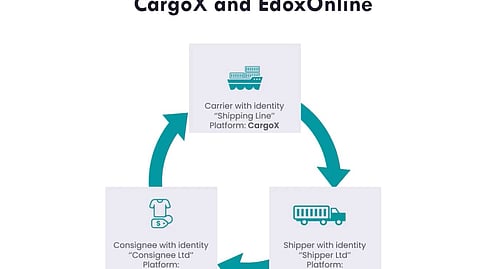World’s First Transaction Between Competing eBL Platforms Executed
An unprecedented global trade event concluded on October 25, 2022, at 21:23 CET as interoperability between two competing electronic bill of lading (eBL) platforms, CargoX and edoxOnline, enabled the transfer of an eBL.
A snapshot of the end-to-end digital transfer process, completed in 6 minutes:
25.10.2022 at 21:17 CET - eBL created by the shipping line (on CargoX)
25.10.2022 at 21:18 CET - eBL transferred to the shipper (on edoxOnline)
25.10.2022 at 21:23 CET - eBL transferred to the consignee (on edoxOnline)
25.10.2022 at 21:23 CET - eBL surrendered to the shipping line (on CargoX)
An electronic bill of lading, part of electronic trade documents and Advance Cargo Information (ACI), is a digital version of a traditional paper bill of lading, a document used in shipping goods by sea, air, or land.
An eBL typically contains the same information as a paper bill of lading, including details about the shipper, the consignee, the goods being transported, and the terms and conditions of the shipment.
The main difference between an eBL and a paper bill of lading is that the former is created and stored electronically, using computer systems and networks, rather than printed on paper.
The interoperability proved successful as it enabled a secure, rapid and efficient transfer of title documents between parties using different eBL platforms, unleashing powerful velocity and efficiency for global trade and the entire shipping industry.
MSC Launches Electronic Bill of Lading Service
McKinsey and Company recently completed a study on trade digitalization, concluding that eBL could save $6.5 billion in direct costs while allowing $40 billion in global trade by streamlining trade documentation, a paper-intensive and resource-consuming process.
Stefan Kukman, founder and CEO of CargoX, a blockchain document transfer solution provider, said: "We are proud to be part of this first-in-history interoperability launch between eBL platforms. Distributed global computing solutions have emerged as an alternative to centralized systems.
"It is only logical that eBL platforms provide interoperability between them to avoid centralization and market manipulation. We support standards-driven interoperability, and we firmly believe this is good for all economic operators and governmental entities participating in global trade.
Peter Kern, CCO at CargoX said: "Interoperability is not just a word - It includes strong compliance with open-source digital standards published by DCSA and implementation of these standards in each solution that shall participate in the global eBL market.
"Interoperability will enable companies and governmental entities to choose their preferred provider and exchange electronic trade documents with other entities, regardless of which platform they are using,"
Transferring the BL control (possession & title) is accomplished by sending a "transfer block" from the sending platform to the receiving platform.
A transfer block is a single JSON structure that includes (i) data of the BL according to the DCSA transport document specification being tested in the proof of concept; and (ii) the complete endorsement chain as signed eblEnvelopes are transferred between platforms.
The endorsement chain includes the signature of the eblEnvelope - signed with the private key of the sending platform, the SHA-256 hash of the eblEnvelope and the eblEnvelope itself.
The sending platform signs the EBL envelope. This signature and the hash of the eblEnvelope are transferred alongside the eblEnvelope so the receiving party can verify receipt.
Alejandro Pernias, CEO of Global Share (edoxOnline) said: "The digitalization of international trade processes and documents is our core business.
"We are committed to working with DCSA to help further the adoption of digital documents in international trade. Having a standardized framework that ensures interoperability will help the industry provide a better customer experience while reducing paper and carbon footprint."
Read More: DCSA Begins Final Phase of eBL Platform Interoperability PoC


